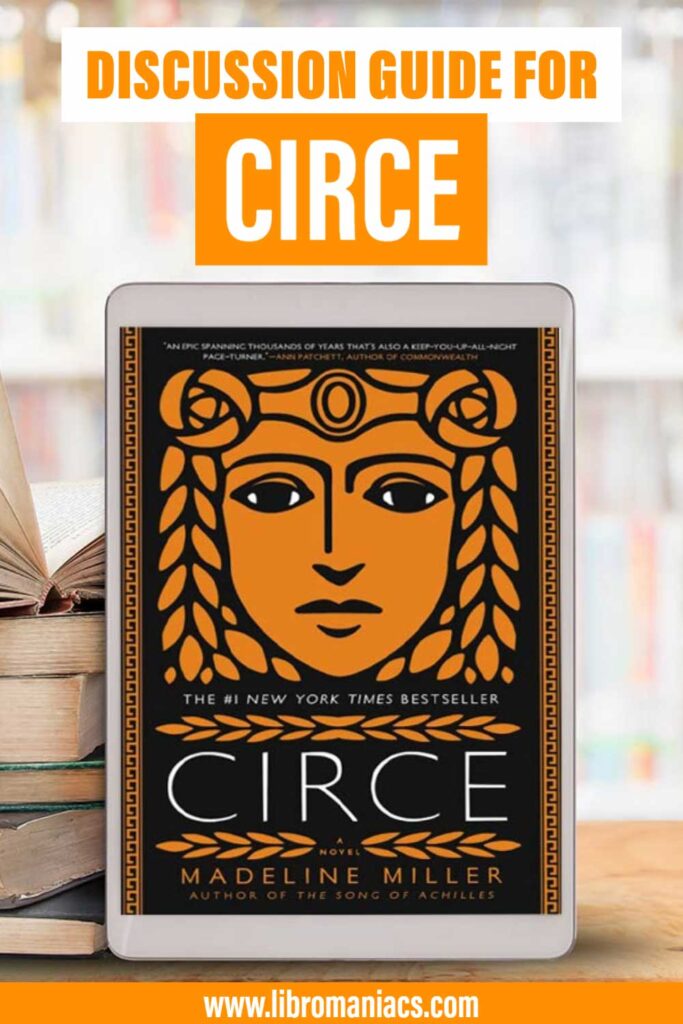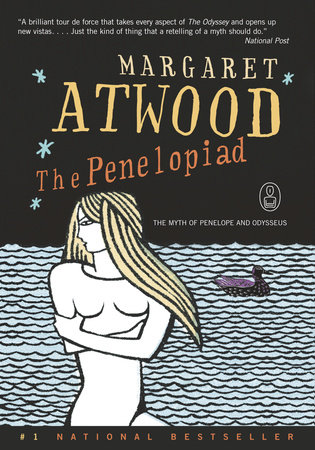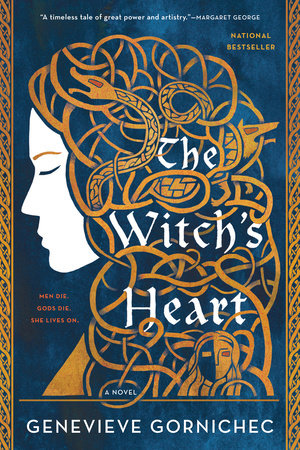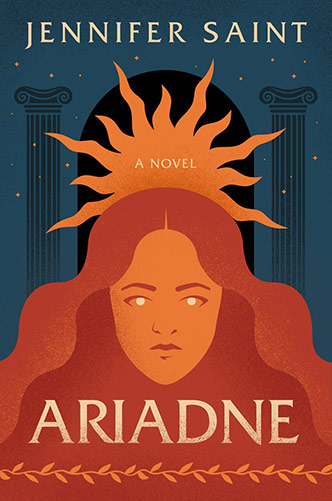If your book club enjoys an adventurous story with a complex heroine, then look no further. Madeline Miller’s Circe is the perfect choice for your group. In The Odyssey, Circe is a minor nymph deity who’s portrayed as an antagonist. Miller reimagines Circe‘s story, giving her a voice as a the protagonist with a full character arc. It’s a fresh feminist retelling and a celebration of invincible female strength in a man’s world.
This epic spans thousands of years, with many colorful characters throughout, providing your group with plenty of things to discuss. Our Circe discussion guide will help you explore themes like: a lifetime of adventure, monsters, and famous deities, bloodshed, love, betrayal, and a whole lot of magic.
So, get started with these 10 Circe book club questions, along with a synopsis and thought provoking reviews. And if you liked the story, we’ve recommended three related reads at the bottom.
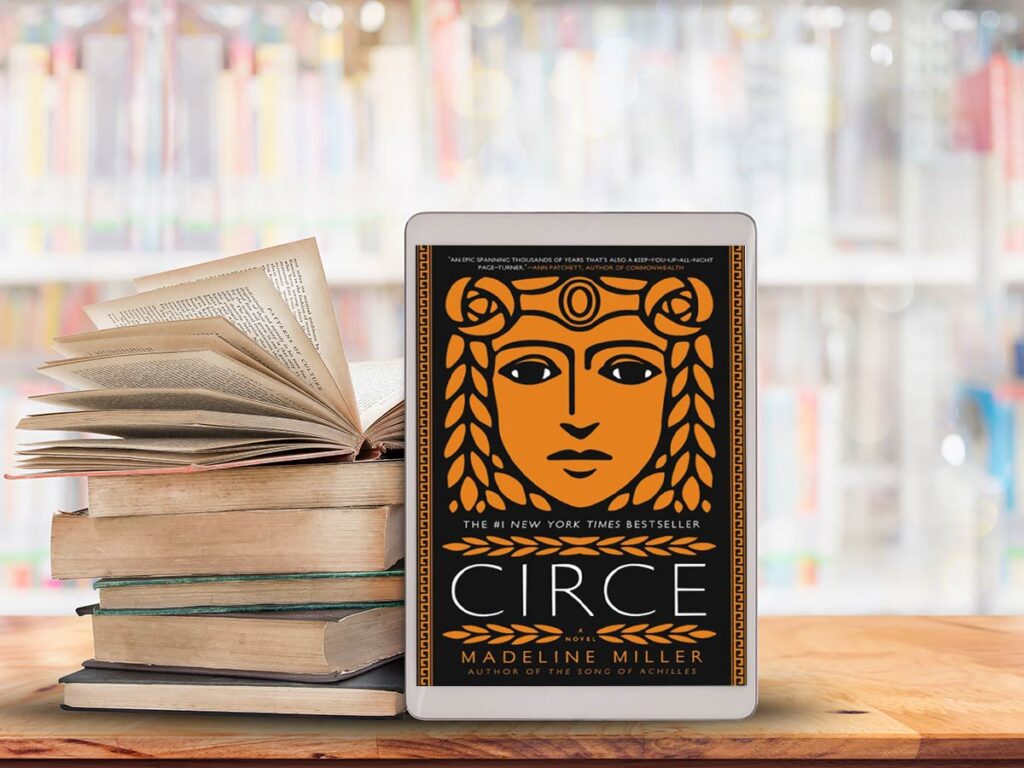
(This article contains affiliate links. This means that if you choose to purchase, I’ll make a small commission.)
Circe Synopsis
Circe, by Madeline Miller
In the house of Helios, god of the sun and mightiest of the Titans, a daughter is born. But Circe is a strange child — not powerful, like her father, nor viciously alluring like her mother. Turning to the world of mortals for companionship, she discovers that she does possess power — the power of witchcraft, which can transform rivals into monsters and menace the gods themselves.
Threatened, Zeus banishes her to a deserted island, where she hones her occult craft, tames wild beasts and crosses paths with many of the most famous figures in all of mythology, including the Minotaur, Daedalus and his doomed son Icarus, the murderous Medea, and, of course, wily Odysseus.
But there is danger, too, for a woman who stands alone, and Circe unwittingly draws the wrath of both men and gods, ultimately finding herself pitted against one of the most terrifying and vengeful of the Olympians. To protect what she loves most, Circe must summon all her strength and choose, once and for all, whether she belongs with the gods she is born from, or the mortals she has come to love.
With unforgettably vivid characters, mesmerizing language, and page-turning suspense, Circe is a triumph of storytelling, an intoxicating epic of family rivalry, palace intrigue, love and loss, as well as a celebration of indomitable female strength in a man’s world.
Circe Book Club Questions
- Unlike most gods and goddesses, Circe has great empathy for mortals. In what other ways does Circe differ from the other deities?
- “It is a common saying that women are delicate creatures, flowers, eggs, anything that may be crushed in a moment’s carelessness. If I had ever believed it, I no longer did.”
Do you agree that this story is considered a feminist portrayal of Circe, when in comparison to her portrayal in the Odyssey? Why or why not? - Aside from Circe herself, who did the author portray differently from their traditional stories? How was the portrayal different?
- How does Circe’s encounter with her uncle, Prometheus, change her? How does it continue to affect her actions?
- In Homer’s The Odyssey, Circe is depicted as the antagonist. How does Miller transform her into the protagonist in this book?
- Circe’s sister, Pasiphae was a major antagonist at the start of the story. How does your perception of her change later on in the story, such as when Circe goes to Crete?
- Though Circe is immortal herself, she isn’t treated well by the other deities. Does this make her a more relatable character? Why or why not?
- What did you think about how the gods and goddesses were portrayed? What statement may have Miller been making?
- Throughout the book, Circe draws distinctions between mortals and immortals. How does Glaucus change when he transforms from a man to a god?
- What is the ultimate theme or the big idea at the end of the book pertaining to Circe’s final decision?
Selected Reviews of Circe
Some readers loved the perspective…and others couldn’t hang for the scale. These are an interesting mix of reviews for Circe which may also help to stimulate your group discussion.
“The way the author chooses her words in this story is beautiful and mesmerizing. Even the simplest of phrases are written poetically…At times, I found the story to be enticing and heartbreaking and it was hard to put it down. Other times, I was struggling to keep it in my hands as I read through long stretches of boring and what felt like empty subplots.”
“The thing that brings this whole novel together is Circe’s character. She is a woman who has done awful, evil things, and yet remains unfailingly human. She is lonely, and harsh, and hiding herself in sarcasm much of the time. And there is not a moment in this novel in which I didn’t adore her.”
“I thought the first half (or so) was great! 5 stars all the way…But, then things came to a screeching halt. About halfway through until there was about 5% of the book left, not much really happened. I kept thinking that the adventure and story was just taking a break and would get going again, but it was more of a permanent break.”
“Unlike her first novel, that was equally good, I felt Circe had a more gripping hold, that would make it impossible to put the books down…Rather than depicting heroes and gods of the past flawless, Miller has made sure to limn the various characters with their flaws and mistakes, that lends the whole tale a tincture of reality.”
3 Books Like Circe
If you want to keep going with Miller, you could also do The Song of Achilles— and we have a reading guide for Achilles as well as a list of books to read if you loved The Song of Achilles.
If you liked the speculative history angle, then try Sue Monk Kidd’s The Book of Longings, which offers a take on Jesus’ marriage to Ana. Or try The Marriage Portrait (Maggie O’Farrell), which is an alternative retelling of Lucrezia in Renaissance Italy.
The Penelopiad, Margaret Atwood
Another book that is told from the point of view of a woman. Penelope retells events that she went through from her childhood to her marriage to Odysseus. Atwood’s story gives us more depth to the character than ever before. The setting is in the 21st century and Penelope is sick of hearing the one version of her story which centers around her husband. So, she decides to retell her story from the afterlife, with the help of her twelve maids.
The Witch’s Heart, Genevieve Gornichec
A story that involves Norse mythology. It’s both a love story and a war epic. The Witch’s Heart gives voice to silent female characters of myth and legend. Angrbroda, a witch, who refuses to help Odin, is punished with fire. After that she flees to a forest and meets a man named Loki. Over time she falls in love with the trickster god.
Ariadne, Jennifer Saint
Typically, a minor character in the stories of Theseus and the Minotaur, Ariadne is the center of the action in this retelling of the Princess of Crete. She betrays her own family by helping the man of her dreams, prince Theseus, kill her brother, the Minotaur. Will choosing love over family ensure her a happy ending?
Have a listen on Audible. Try audio books for free for 30 days.
Share this Circe discussion guide with your friends:

